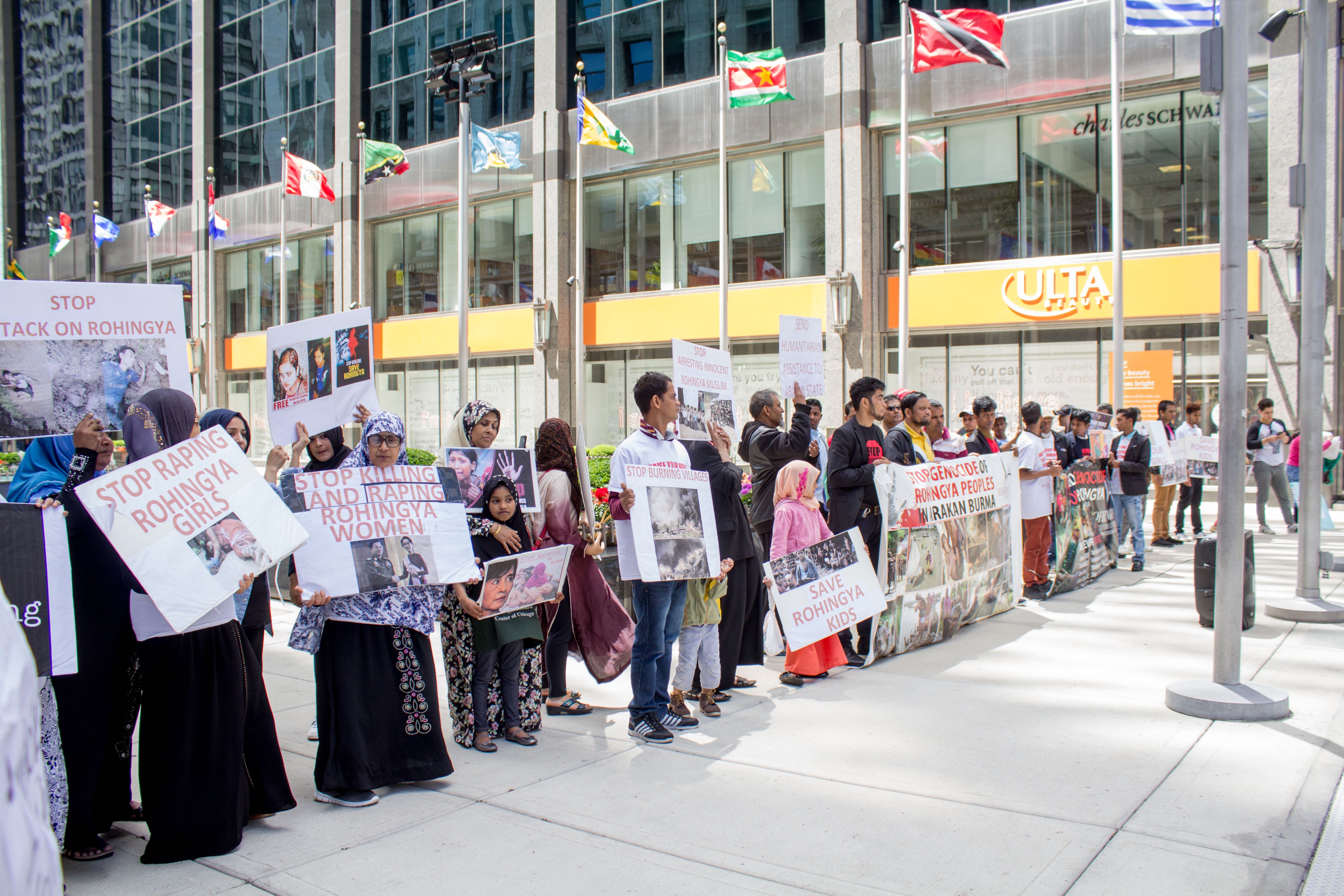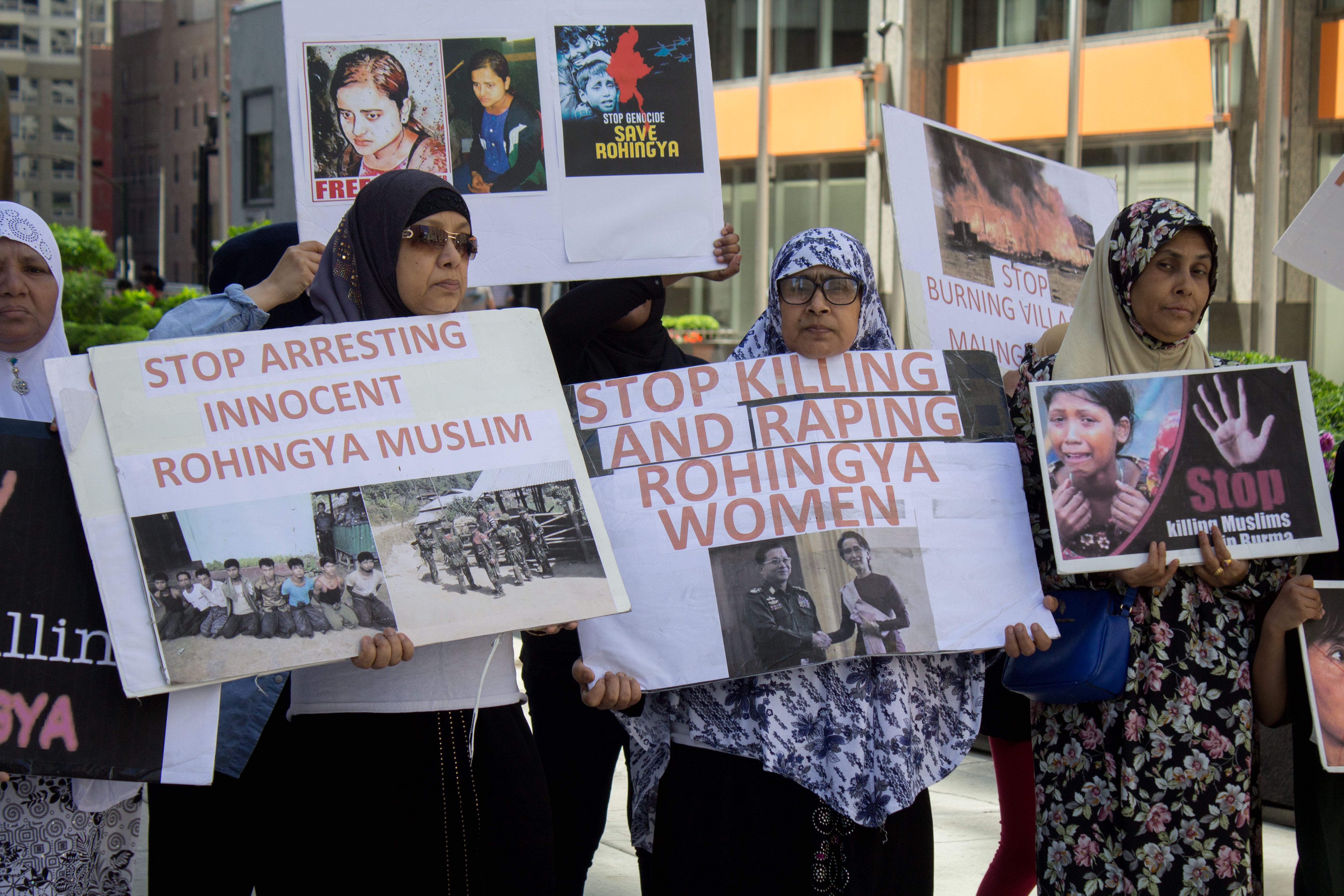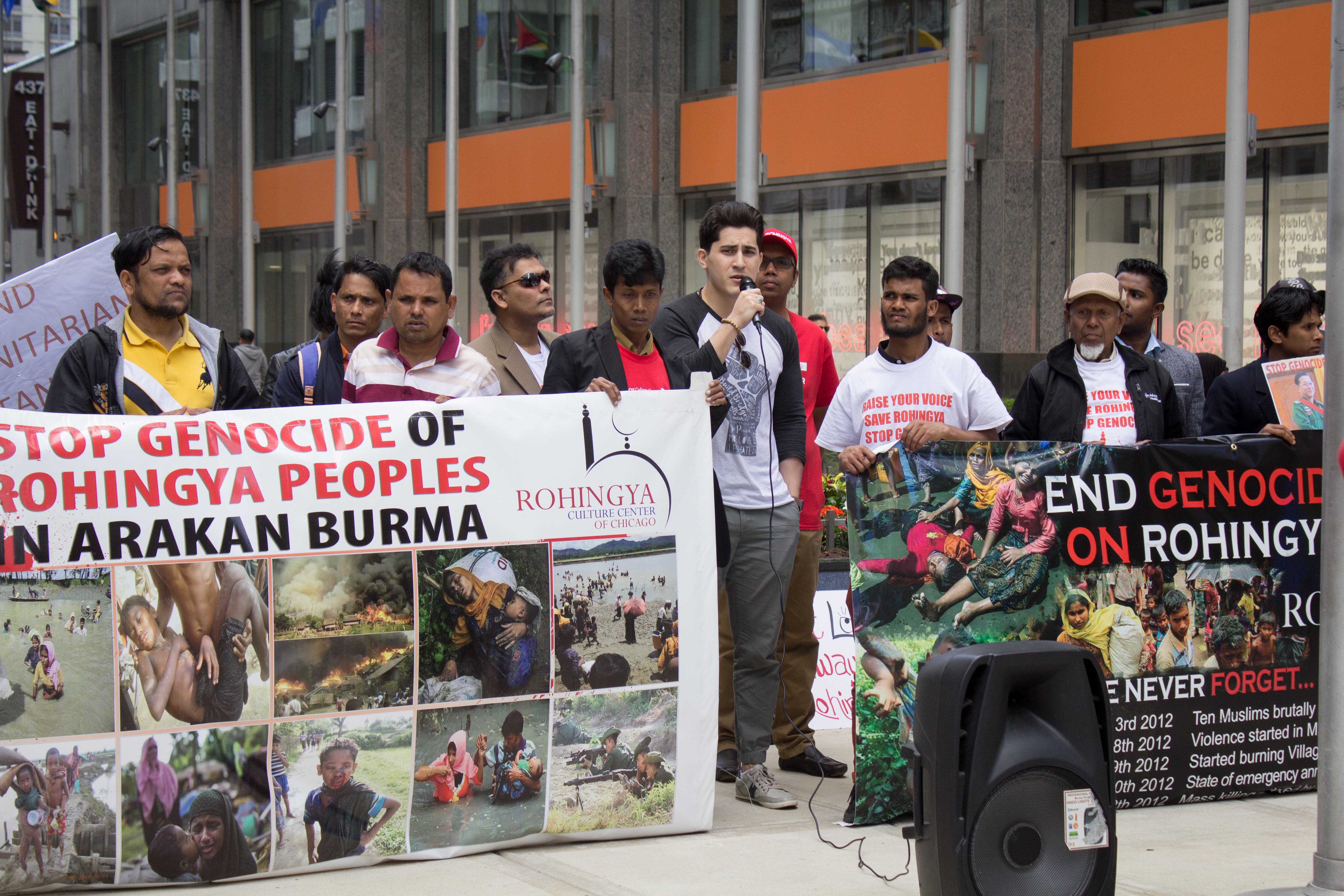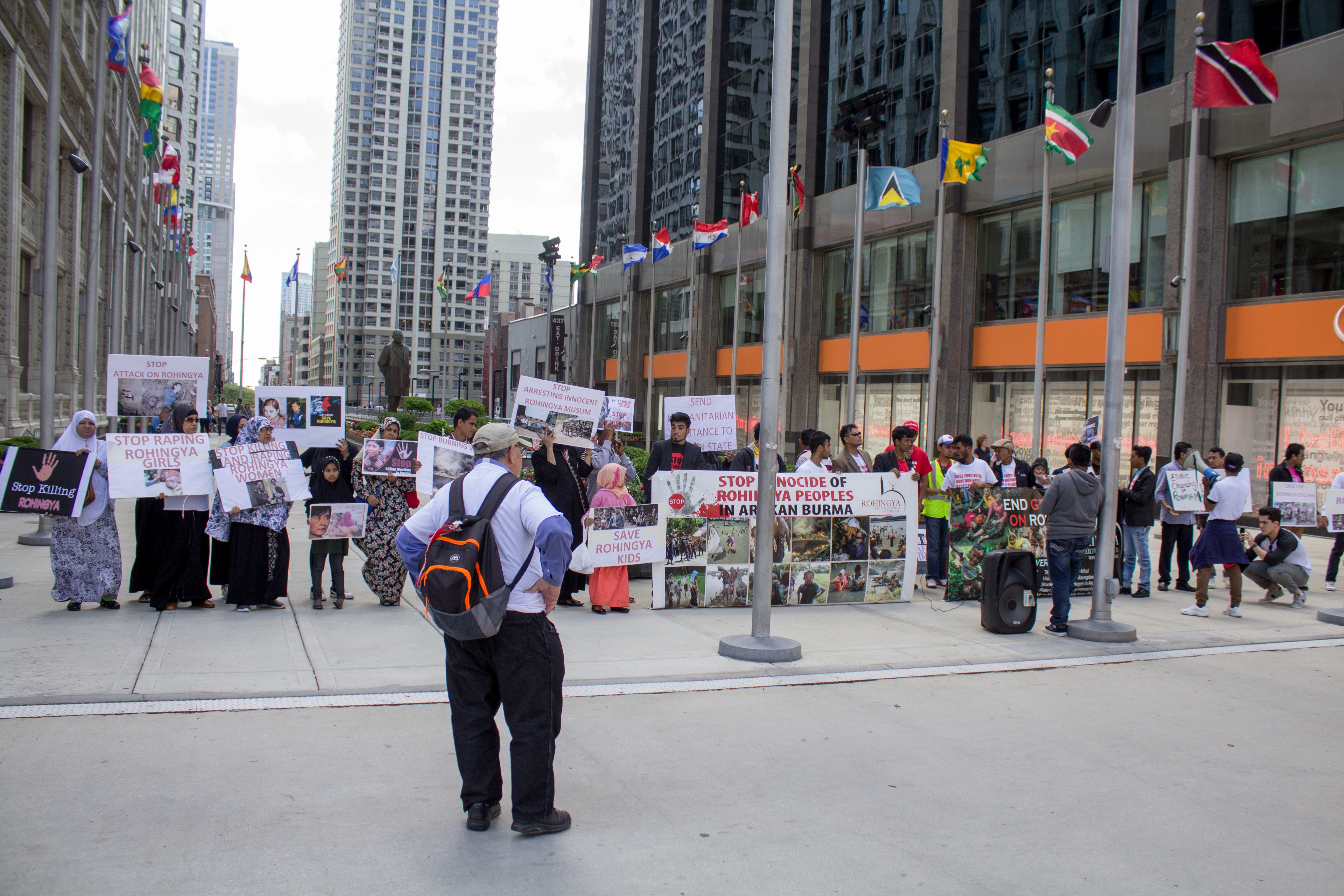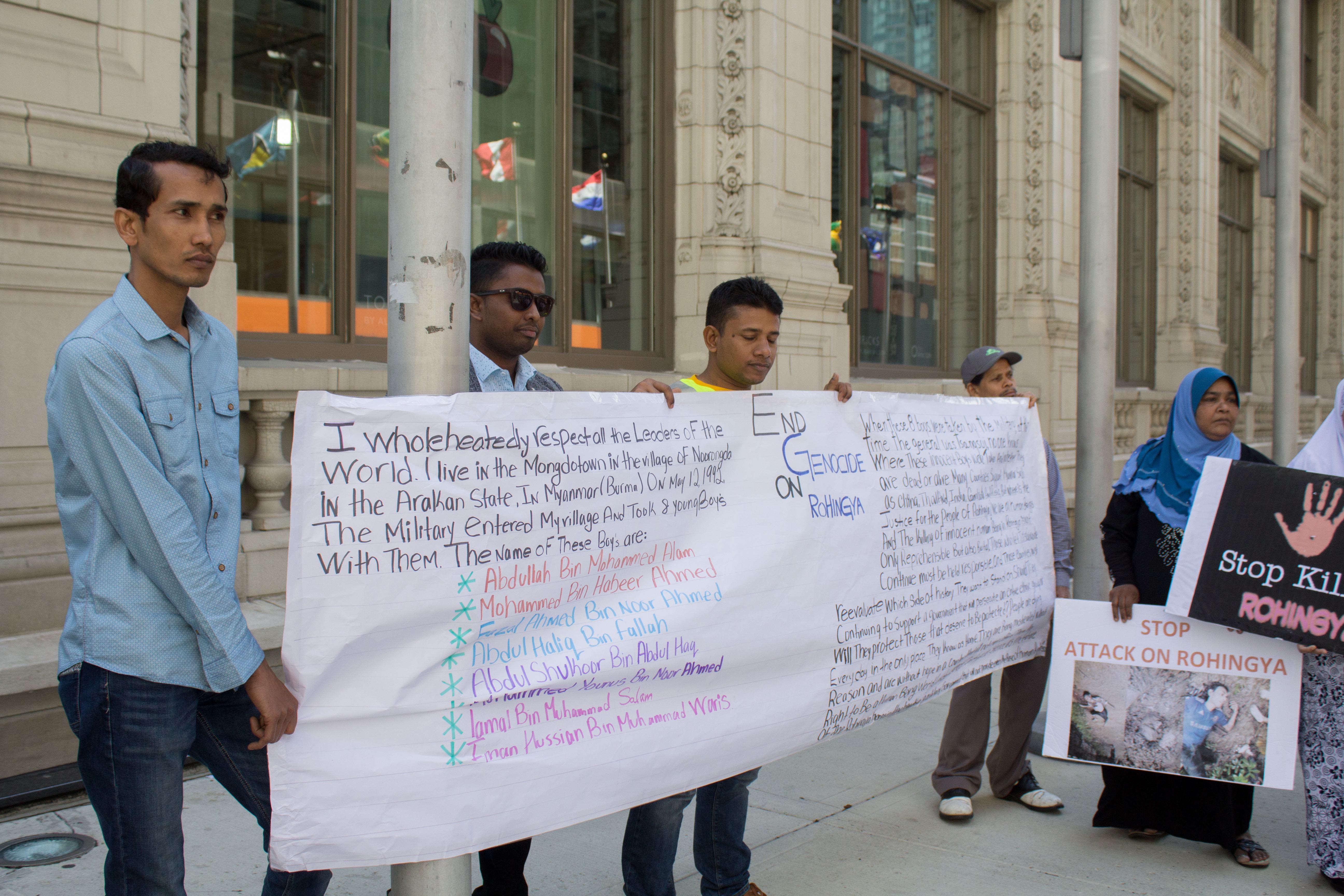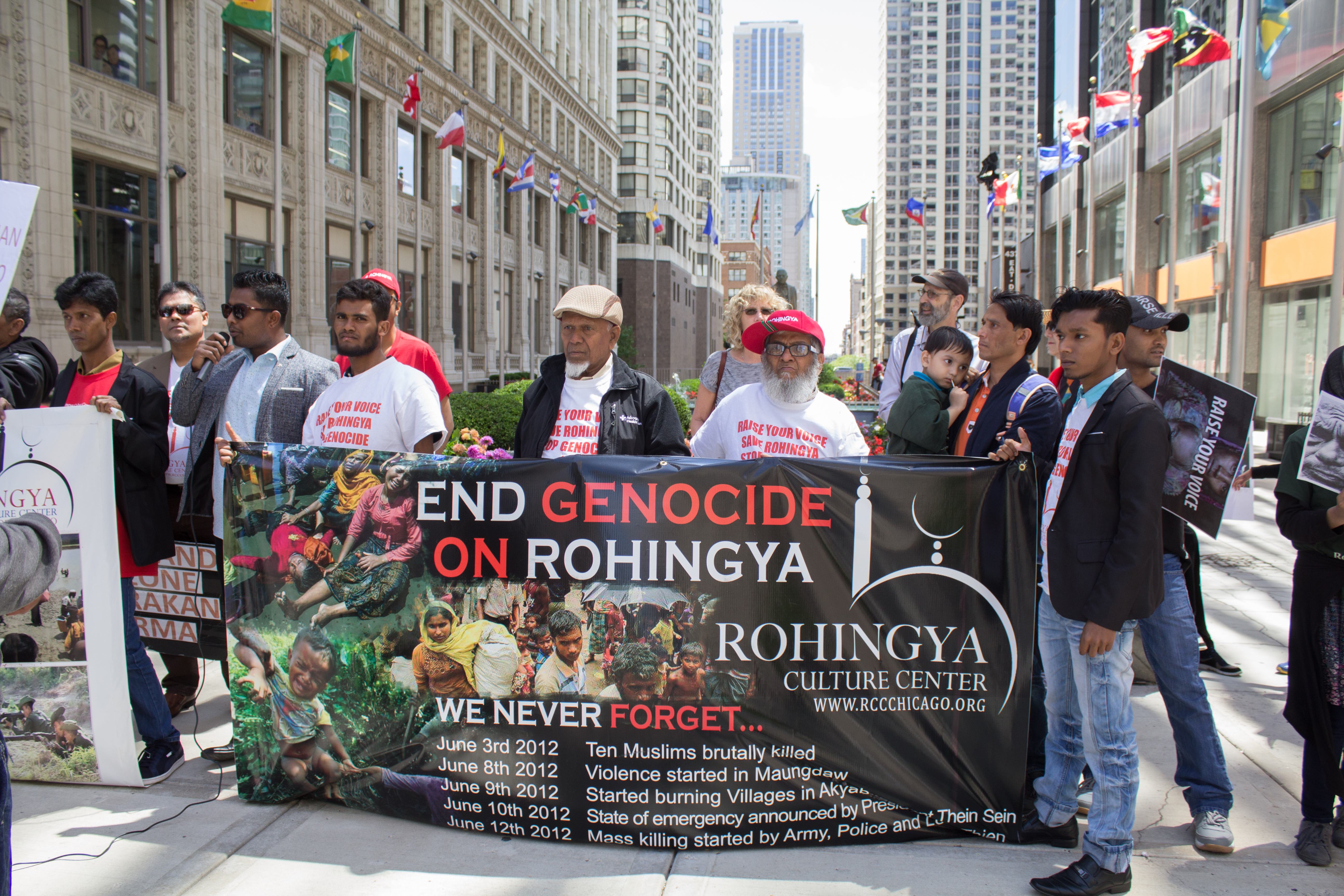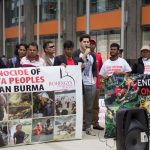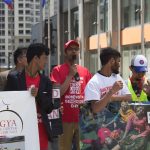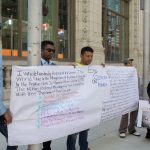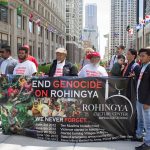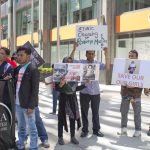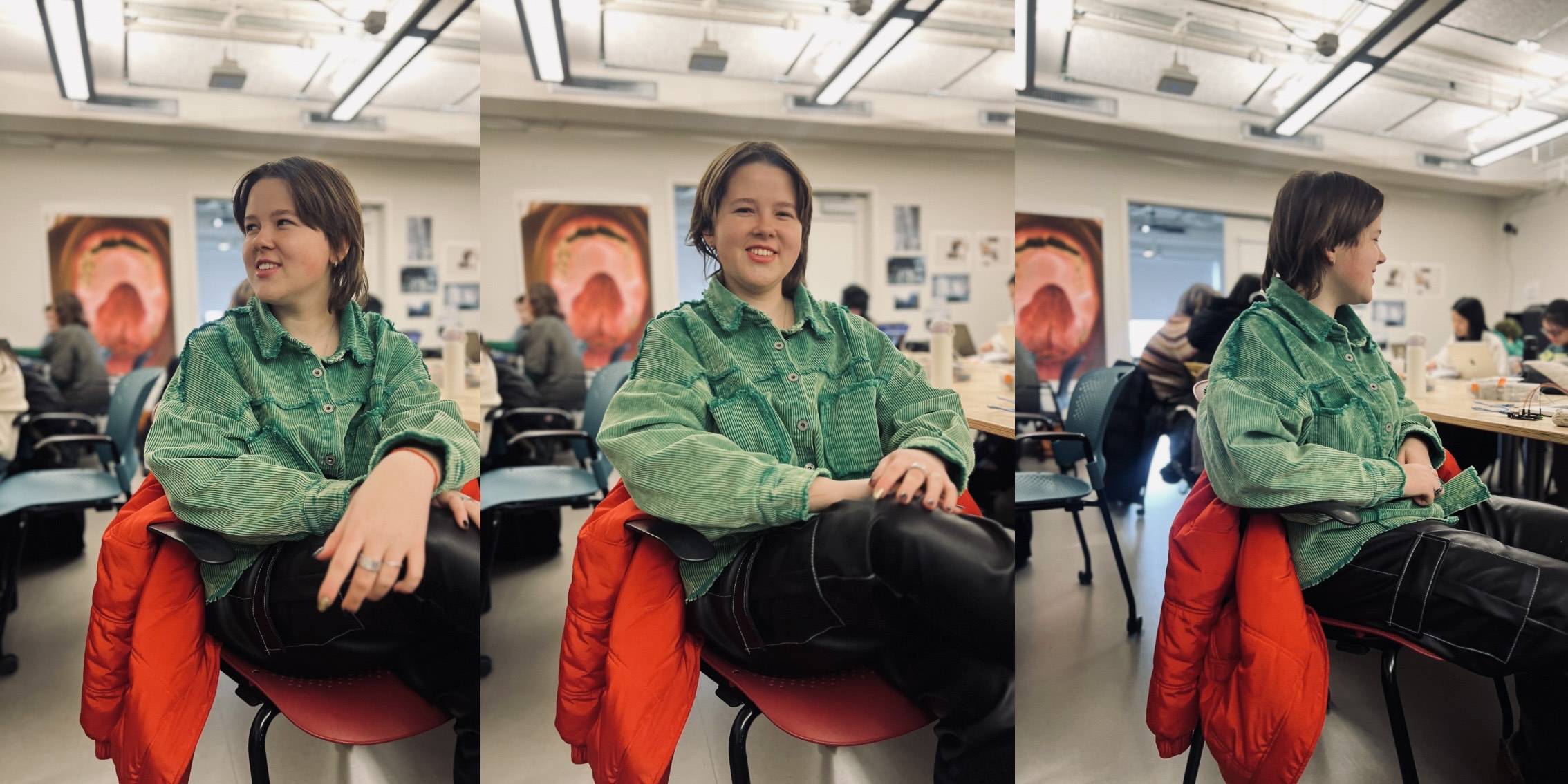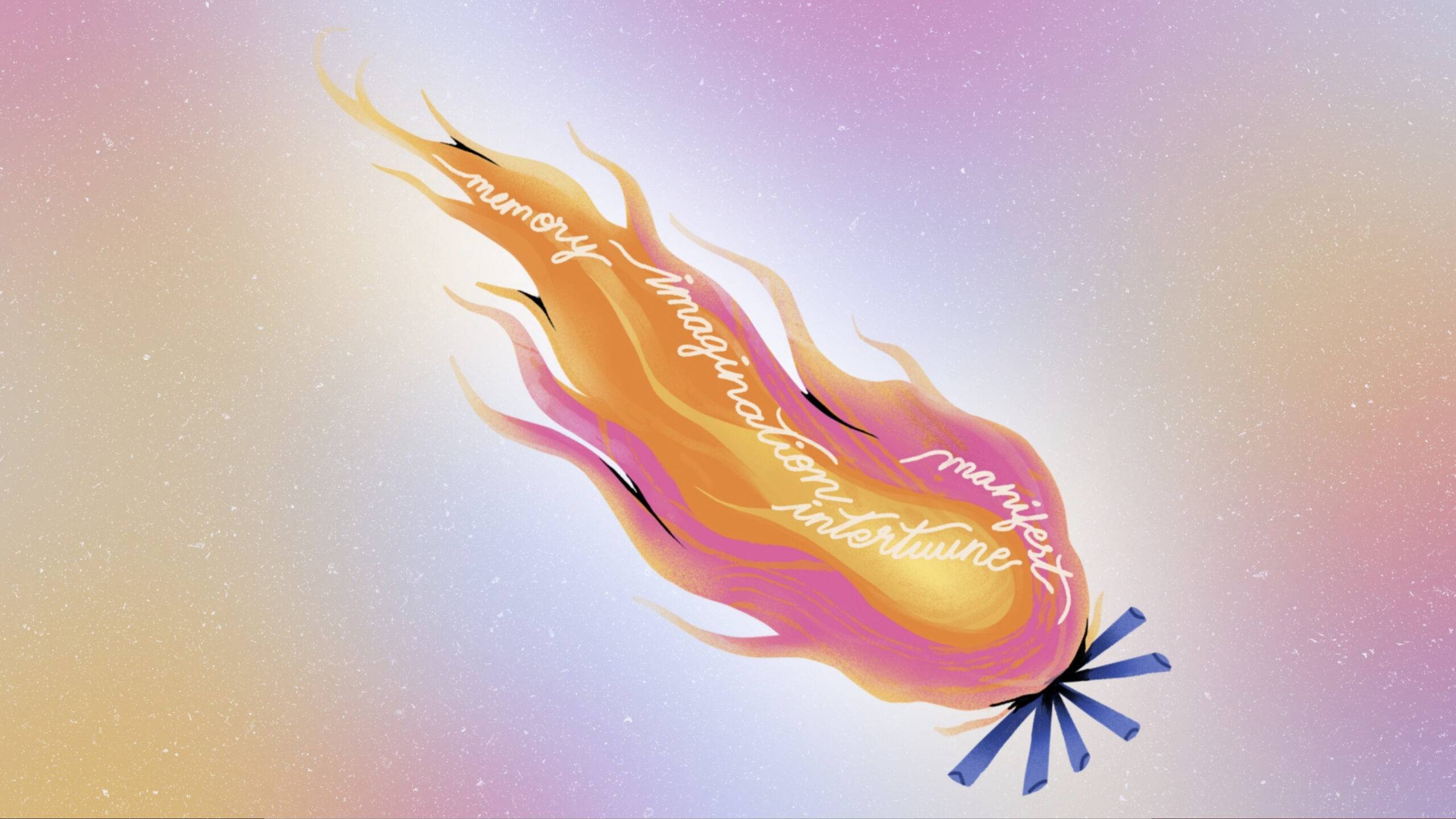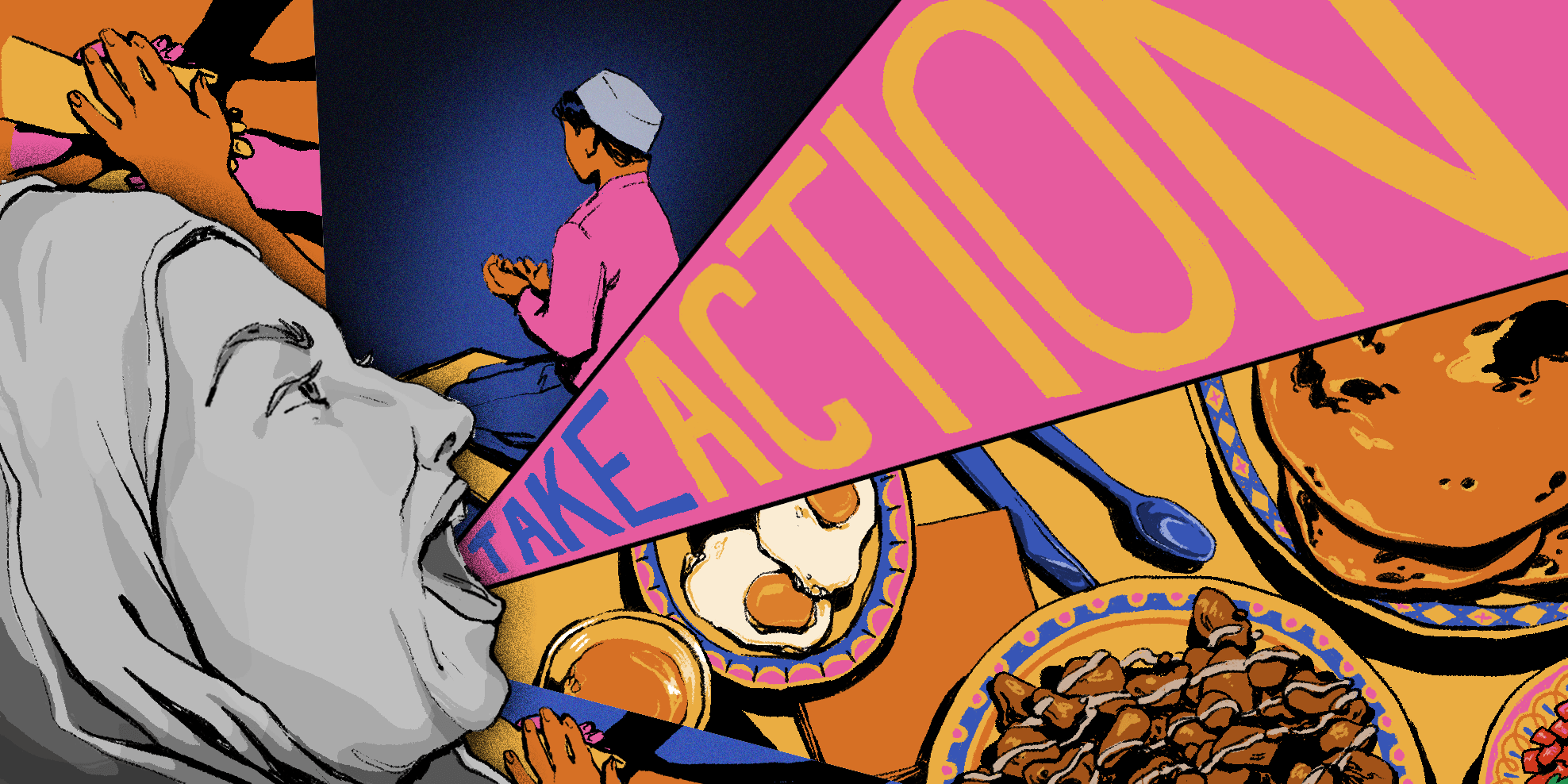Content warning: This article contains descriptions of sexual assault, manslaughter, and genocide.
Demonstrators gathered to protest the genocide of the Rohingya Muslim minority of Burma at the Plaza of the Americas in Magnificent Mile on June 3. About fifty people attended, mostly Rohingya or people otherwise affiliated with the Rohingya Culture Center (RCC), the social service organization for Chicago’s Rohingya community.
Speakers at the protest reported the plight of the Rohingya to the gathered group and passers-by of the flag-lined pedestrian space, sometimes sharing personal stories and often breaking into chants. One speaker said, “We have a responsibility to protect each other, please raise your voice, call your senator” and asked us to “please stand with us as a human being to stop genocide in Burma.”
The Rohingya are an ethnic Muslim minority of Buddhist-majority Burma. The United Nations High Commissioner for Human Rights describes them as “the most persecuted minority in the world.” Residing largely in the Rakhine state (formerly Arakan province), the Rohingya constitute the largest percentage of Muslims in Burma. They have been denied citizenship since 1982 and were not recognised as a people in the 2014 census, despite their one million population at the beginning of 2017. In Burma, the Rohingyas’ rights to study, work, vote, travel, marry, practice their religion, and access health services are all restricted.
June 3 falls in the middle of Ramadan this year. Most participants in the protest fasted during the event. “Without food, without water, we’re demonstrating because the reality is June 3 is the commemoration day of the Rohingya genocide. We are here to remind the people of the United States, we want to tell you, this day they are killing us,” Nasir Zakaria, Executive Director of RCC, told F Newsmagazine. The date represents the anniversary of a brutal series of attacks that took place in Burma in 2012.
A school group of 19 travelled together from Joyce Kilmer Elementary School in Rogers Park to attend. Mohammed, 14, was one of the students, recently arrived back from a school trip to Washington, D.C. He attended the protest in support of his family. “I just want Chicago people to stand with us, raise their voice and stop genocide,” Mohammed said.
Hasan Korimullah was one of the event’s speakers. He was 8 or 9 years old when he and his mother were ambushed in Burma on their way home by two men with machetes. Hasan escaped. However, images of his mother hacked to death are permanently imprinted in his mind. He eventually made it to Chicago but has not seen any of his family since 2012.
Burma’s military forces began a brutal crackdown in Rakhine in 2017, torturing and killing tens of thousands of Rohingya, razing villages, and raping Rohingya women, after the Arakan Rohingya Salvation Army (ARSA) attacked police posts throughout the region.
At least 6,700 Rohingya, including at least 730 children under the age of five, were murdered in the first month of the violence that broke out on August 25, 2017. The government claims only 400 were killed in “clearance operations” against militants. The government also claims these operations ended on September 5. However, there is evidence that operations continued even after this date.
Signs at the protest included demands to Burma’s government, such as “Stop arresting innocent Rohingya Muslim” and “we demand a safe zone in Arakan Burma.” Other banners addressed the passers-by, requesting “Don’t look away” and “Send media immediately” (media have been banned from northern Rakhine since August 2017).
At least 288 villages have been partially or completely destroyed by fire since August 2017. However, the conflict goes back at least as far as World War II, with a particularly bloody exodus of 200,000 Rohingya out of the country in 1978.
Over the last five years, Chicago has developed the largest Rohingya community in the United States, with approximately 400 families and 1800 people, Zakaria told F Newsmagazine.
Zakaria founded the RCC in 2016. It is the first institution of its kind for the Rohingya community in the United States. One of the RCC’s key mandates is involvement in raising awareness of the genocide of the Rohingya people. “We raise our voice because it’s our responsibility,” Zakaria said. The RCC is largely funded by the Zakat Foundation, a non-profit based in Illinois.
Mustafa Hussain attended the protest to photograph the event as part of his “refugees after resettlement” series. He is currently undertaking a photojournalism degree at the Rochester Institute of Technology, for which his thesis is about the Rohingya people. This project includes a set of portraits as well as recording small aspects of the Rohingya culture that is in danger of being lost, such as children’s stories and recipes. Most of Hussain’s project material will come from Chicago’s large Rohingya community. “They’ve welcomed me with open arms,” Hussain said about the community.
The United Nations has been denied access to Rakhine since August last year. They are unlikely to intervene within Burma under Chapter VII of the United Nations Charter (the chapter noting the Security Council’s peacekeeping responsibility). China, a permanent member of the Security Council, would veto to any peacekeeping resolution in favour of its economic ties to Burma. India sees the Rohingya as a security threat, and Bangladesh lacks the power to significantly intervene, leaving the Rohingya without a powerful ally in the area. “We don’t have any leadership, we don’t have any powerful countries supporting us to take action,” Zakaria said.
“This is your duty and my duty,” one speaker told the crowd.
Approximately 900, 000 Rohingya currently live in refugee camps in Bangladesh, with approximately 212, 000 fleeing before the crisis in 2017. The Rohingya refugee camps are the largest in the world, Imran Akbar, RCC Advisory Board member, told F News, but they are built on swamp land out of tarpaulin and bamboo and wash away relatively easily. Despite the architecture’s transitory construction, some of refugees have lived in the camps since the early 1990s.
As the monsoon season begins, the structures on higher ground face landslides, while those on lower ground risk flooding. Because the government insists the situation is temporary, only temporary structures can be built. Aid agencies are banned from making long-term plans and are limited to constructing bamboo bridges and handing out sandbags in preparation for the coming storms. Instead of schools, the agencies can only make “child-friendly spaces” in the Bangladesh camps. In these spaces, children are banned from learning Bengali, to make sure they cannot integrate with the locals.
In response to statements that Burma’s government is willing to take back all 900,000 Rohingya Muslim refugees who fled to Bangladesh if they volunteer to return — the latest of such statements occurred the day before the protest at the Shangri-La Dialogue in Singapore — Akbar told F Newsmagazine that the talk right now is “only talking.” With no real action to secure safety in their home country, the Rohingya can only continue to flee in terror. “I don’t think any Rohingya person who’s able to go back would go back,” Akbar said. He described such statements as “political fanfare” that requires “real action first.”
Despite the lack of safety for the Rohingya people in Burma, many of the youth express a longing to return to their parents’ country. One speaker at the protest, Nur, who will graduate from high school next week, said, “My father told me that you cannot go there, they’ll kill you.” She plans to study nursing, travel to the camps, and aid the refugees.
Chicago’s Senator Dick Durbin and Representative Jan Schakowsky participated in a fact-finding mission to Burma and Bangladesh in 2017, where they witnessed first-hand the plight of the Rohingya people. Durbin co-sponsored a bill that passed the Senate Foreign Relations Committee in February to impose sanctions on the Burma government. The Burma Human Rights and Freedom Act aims to prohibit military cooperation until a confirmed halt of violence against the Rohingya. The bill also encourages the transition of power in Burma to a civilian government.
Zakaria described activist acts such as this protest as invaluable. There has been no action by the UN over the last six years, but he hopes that with enough voices change can occur. One speaker said, “We have a responsibility to protect each other, please raise your voice, call your senator … please stand with us as a human being to stop genocide in Burma.”
“RCC asks that the people of the United States please raise your voice to save innocent lives,” Zakaria told F Newsmagazine. “Today we need help so tomorrow we can help other people. This is my hope,” he said.

